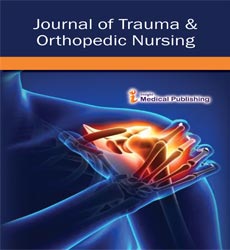Psychological Support and Nursing Care in Patients with Traumatic Amputations: A Holistic Approach
Michael Connor*
Department of Nursing and Midwifery, University of Sydney, Sydney, Australia
Received date: January 02, 2025, Manuscript No. ipton-25-20824; Editor assigned date: January 04, 2025, PreQC No. ipton-25-20824 (PQ); Reviewed date: January 15, 2025, QC No. ipton-25-20824; Revised date: January 20, 2025, Manuscript No. ipton-25-20824 (R); Published date: January 27, 2025, DOI: 10.36648/ipton.8.1.115
Citation: Connor M (2025) Psychological Support and Nursing Care in Patients with Traumatic Amputations: A Holistic Approach. J Trauma Orth Nurs Vol.8 No.1: 115.
Introduction
Traumatic amputations are life-altering events that not only impact physical function but also profoundly affect emotional, psychological, and social well-being. Patients often face challenges such as body image disturbances, grief, anxiety, and depression alongside the functional limitations imposed by limb loss. Nursing care in this context requires a holistic approach that integrates physical rehabilitation, psychological support, and social reintegration. By addressing the multifaceted needs of these patients, nurses play a pivotal role in promoting resilience, functional recovery, and overall quality of life. The sudden loss of a limb is associated with intense emotional reactions. Patients may experience shock, denial, anger, or profound grief. Anxiety regarding mobility, independence, and future prospects is common. Depression and Post-Traumatic Stress Disorder (PTSD) can develop, particularly if the trauma was associated with a catastrophic event. Early recognition of these psychological challenges is essential to prevent long-term mental health consequences [1].
Description
Nurses are often the first point of contact post-amputation and play a critical role in early psychological support. Through empathetic communication, active listening, and reassurance, nurses help patientâ??s process initial emotions. Establishing trust and providing clear information about surgical outcomes, prosthetic options, and rehabilitation pathways can alleviate uncertainty and foster a sense of control. Pain management is a fundamental aspect of care. Traumatic amputees often experience both residual limb pain and phantom limb sensations. Nurses implement pharmacologic interventions, including analgesics and adjuvant medications, alongside non-pharmacologic methods such as relaxation techniques, mirror therapy, and desensitization exercises. Effective pain control facilitates participation in rehabilitation and enhances psychological well-being. estoring mobility and independence is a key goal of nursing care. Nurses collaborate with physiotherapists and occupational therapists to support early mobilization, strength training, and prosthetic adaptation [2].
Guidance in safe transfers, gait training, and use of assistive devices enhances confidence and reduces the risk of secondary injuries. Functional progress positively impacts mental health by promoting self-efficacy. Loss of a limb often leads to body image disturbances, affecting self-esteem and social interactions. Nurses provide counseling, encourage peer support, and facilitate participation in patient support groups. Educating patients about adaptive clothing, prosthetic options, and coping strategies helps them regain a positive self-image and confidence in social settings [3].
Nurses play a crucial role in addressing social and emotional challenges. Interventions include cognitive-behavioral techniques, guided relaxation, and structured goal-setting. Encouraging family involvement strengthens social support networks. In cases of severe distress, referral to mental health professionals ensures comprehensive care. Integrating psychosocial interventions with physical rehabilitation promotes holistic recovery. Families are integral to the adjustment process after amputation. Nurses educate caregivers about wound care, prosthetic management, and mobility assistance. Providing guidance on emotional support, coping strategies, and stress management enhances family capacity to care for the patient, creating a supportive environment conducive to recovery [4].
Reintegration into the community is a critical aspect of holistic care. Nurses facilitate connections to vocational rehabilitation, support groups, and community resources. Encouraging participation in social and recreational activities promotes a sense of normalcy and mitigates isolation, which can contribute to depression and anxiety. Cultural beliefs, personal values, and ethical considerations significantly influence patientsâ?? responses to amputation and rehabilitation. Nurses provide culturally sensitive care, respecting patient autonomy, decision-making, and coping styles. Tailoring interventions to individual preferences enhances engagement and therapeutic outcomes. Effective care for traumatic amputees requires collaboration among surgeons, physiotherapists, occupational therapists, psychologists, and social workers. Nurses act as coordinators, communicating patient needs and progress to ensure integrated, patient-centered care [5].
Conclusion
Psychological support and nursing care are inseparable components of holistic management for patients with traumatic amputations. By addressing pain, functional rehabilitation, emotional well-being, and social reintegration, nurses enhance both recovery and quality of life. Through empathetic communication, education, and multidisciplinary collaboration, nursing interventions empower patients to adapt to limb loss, regain independence, and achieve resilience. A holistic approach ensures that care encompasses the full spectrum of needsâ??physical, psychological, and socialâ??thereby fostering meaningful recovery and long-term well-being.
Acknowledgement
None.
Conflict of Interest
None.
References
- Özparlak A, Karakaya D, Kara H, Çelik, E. (2025). The relationship between selfâ?compassion and caring behaviour in nurses: A crossâ?sectional study. Int Nurs Rev72: e13017.
Google Scholar Cross Ref Indexed at
- Garon M. (2012). Speaking up, being heard: registered nurses’ perceptions of workplace communication. J Nurs Manag20: 361-371.
Google Scholar Cross Ref Indexed at
- Hall LH, Johnson J, Watt I, Tsipa A, O’Connor DB. (2016). Healthcare staff wellbeing, burnout, and patient safety: A systematic review. PloS One11: e0159015.
Google Scholar Cross Ref Indexed at
- Kulbok PA, Carter KF, Baldwin CJH, Gilmartin MJ, Kirkwood B. (1999). Behavior Inventory. J Nurs7.
Open Access Journals
- Aquaculture & Veterinary Science
- Chemistry & Chemical Sciences
- Clinical Sciences
- Engineering
- General Science
- Genetics & Molecular Biology
- Health Care & Nursing
- Immunology & Microbiology
- Materials Science
- Mathematics & Physics
- Medical Sciences
- Neurology & Psychiatry
- Oncology & Cancer Science
- Pharmaceutical Sciences
